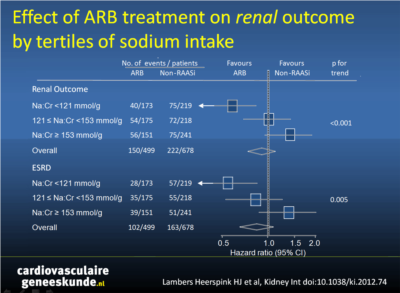Renale en CV beschermende effecten van ARBs versterkt door zoutrestrictie
Literatuur - Lambers Heerspink HJ et al, Kidney Int doi:10.1038/ki.2012.74Lambers Heerspink HJ, Holtkamp FA, et al.
Kidney Int doi:10.1038/ki.2012.74
De resultaten van deze studie tonen ondubbelzinnig aan dat zoutreductie essentieel is voor bescherming tegen hart-en vaatziekten en progressie van nierschade bij patienten die hiervoor zijn aangewezen op RAAS-blokkade. Bovendien laat de studie zien dat het gunstige effect al optreedt bij een slechts milde zoutbeperking, hetgeen overeenkomt met recente resultaten uit korte termijn studies en bij patienten met niet-diabetische nierziekte. Deze resultaten tonen het belang van leefstijl-correctie naast optimale farmacotherapeutische behandeling. Op grond van deze resultaten mag in de toekomst veel gezondheidswinst worden verwacht.
Het doel van deze studie was om te onderzoeken of een zoutarm dieet (= lage urine-natrium excretie) de effectiviteit van een ARB verhoogt op de harde renale en cardiovasculaire eindpunten bij type 2-diabetici met nefropathie. Daarom werden gegevens van de Reduction of Endpoints in NIDDM with the Angiotensin II Antagonist Losartan (RENAAL) en Irbesartan Diabetic Nephropathy Trial (IDNT) onderzoeken samengevoegd en geanalyseerd.
In het laagste tertiel werd een trend richting grotere relatieve risicoreductie voor hospitalisatie voor hartfalen waargenomen.
1. Brenner BM, Cooper ME, de Zeeuw D et al. Effects of losartan on renal and cardiovascular outcomes in patients with type 2 diabetes and nephropathy. N Engl J Med 2001; 345: 861–869.
2. Lewis EJ, Hunsicker LG, Clarke WR et al. Renoprotective effect of the angiotensin-receptor antagonist irbesartan in patients with nephropathy due to type 2 diabetes. N Engl J Med 2001; 345: 851–860.
3. Parving HH, Lehnert H, Brochner-Mortensen J et al. The effect of irbesartan on the development of diabetic nephropathy in patients with type 2 diabetes. N Engl J Med 2001; 345: 870–878.
4. Lambers Heerspink HJ, Ninomiya T, Perkovic V et al. Effects of a fixed combination of perindopril and indapamide in patients with type 2 diabetes and chronic kidney disease. Eur Heart J 2010; 31: 2888–2896.
5. Ekinci EI, Thomas G, Thomas D et al. Effects of salt supplementation on the albuminuric response to telmisartan with or without hydrochlorothiazide therapy in hypertensive patients with type 2 diabetes are modulated by habitual dietary salt intake. Diabetes Care 2009; 32: 1398–1403.
6. Vogt L, Waanders F, Boomsma F et al. Effects of dietary sodium and hydrochlorothiazide on the antiproteinuric efficacy of losartan. J Am Soc Nephrol 2008; 19: 999–1007.
Kidney Int doi:10.1038/ki.2012.74
Commentaar van de auteur:
De resultaten van deze studie tonen ondubbelzinnig aan dat zoutreductie essentieel is voor bescherming tegen hart-en vaatziekten en progressie van nierschade bij patienten die hiervoor zijn aangewezen op RAAS-blokkade. Bovendien laat de studie zien dat het gunstige effect al optreedt bij een slechts milde zoutbeperking, hetgeen overeenkomt met recente resultaten uit korte termijn studies en bij patienten met niet-diabetische nierziekte. Deze resultaten tonen het belang van leefstijl-correctie naast optimale farmacotherapeutische behandeling. Op grond van deze resultaten mag in de toekomst veel gezondheidswinst worden verwacht.Achtergrond
Middelen die interfereren met het renine-angiotensine-aldosteron systeem (RAASi) worden beschouwd als essentieel in de preventie van end-stage renale en hart-en vaatziekten bij patiënten met diabetes, zowel in een vroeg als laat stadium [1-4]. Om de effectiviteit van RAASi verder te optimaliseren, kan zoutbeperking nuttig zijn, omdat dit de respons van zowel de bloeddruk als albuminurie op ARBs bij diabetici en bij niet-diabeten met een chronische nierziekte kan verbeteren[5,6].Het doel van deze studie was om te onderzoeken of een zoutarm dieet (= lage urine-natrium excretie) de effectiviteit van een ARB verhoogt op de harde renale en cardiovasculaire eindpunten bij type 2-diabetici met nefropathie. Daarom werden gegevens van de Reduction of Endpoints in NIDDM with the Angiotensin II Antagonist Losartan (RENAAL) en Irbesartan Diabetic Nephropathy Trial (IDNT) onderzoeken samengevoegd en geanalyseerd.
Belangrijkste resultaten
Lange-termijn effecten op de renale en cardiovasculaire events waren het grootst in het laagste tertiel van natriuminname bij ARB therapie in vergelijking met non-RAASi-therapie. De effecten op renale en cardiovasculaire events zwakte af bij patiënten met een hogere natriumconsumptie; in het hoogste tertiel werden de beschermende effecten volledig teniet gedaan.In het laagste tertiel werd een trend richting grotere relatieve risicoreductie voor hospitalisatie voor hartfalen waargenomen.
Conclusie
Matig lage inname van natrium met de voeding versterkt het effect van RAAS interventie op renale en cardiovasculaire uitkomsten. Deze gegevens ondersteunen de roep om op bevolkingsniveau zoutinname via de voeding te verminderen, niet alleen vanwege het gunstige effect op de renale / CV morbiditeit / mortaliteit, maar ook om de gunstige invloed op de respons op RAAS interventie.
Referenties
1. Brenner BM, Cooper ME, de Zeeuw D et al. Effects of losartan on renal and cardiovascular outcomes in patients with type 2 diabetes and nephropathy. N Engl J Med 2001; 345: 861–869.2. Lewis EJ, Hunsicker LG, Clarke WR et al. Renoprotective effect of the angiotensin-receptor antagonist irbesartan in patients with nephropathy due to type 2 diabetes. N Engl J Med 2001; 345: 851–860.
3. Parving HH, Lehnert H, Brochner-Mortensen J et al. The effect of irbesartan on the development of diabetic nephropathy in patients with type 2 diabetes. N Engl J Med 2001; 345: 870–878.
4. Lambers Heerspink HJ, Ninomiya T, Perkovic V et al. Effects of a fixed combination of perindopril and indapamide in patients with type 2 diabetes and chronic kidney disease. Eur Heart J 2010; 31: 2888–2896.
5. Ekinci EI, Thomas G, Thomas D et al. Effects of salt supplementation on the albuminuric response to telmisartan with or without hydrochlorothiazide therapy in hypertensive patients with type 2 diabetes are modulated by habitual dietary salt intake. Diabetes Care 2009; 32: 1398–1403.
6. Vogt L, Waanders F, Boomsma F et al. Effects of dietary sodium and hydrochlorothiazide on the antiproteinuric efficacy of losartan. J Am Soc Nephrol 2008; 19: 999–1007.


Deel deze pagina met collega's en vrienden: